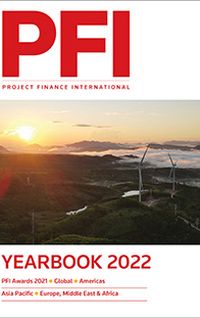Eight international banks have signed a revolving construction financing of US$1.1bn, initially funding four transmission assets spread across various states in India being developed by various subsidiaries of Adani Transmission Ltd. By Santosh Janakiram, Subhalakshmi Naskar and Pururaj Bhar, partners in Cyril Amarchand Mangaldas.
Adani Transmission Ltd (ATL), India’s largest private sector power transmission and retail distribution company, through its subsidiaries, has entered into a committed facility with eight international banks to raise US$1.1bn for part financing the capital expenditure cost of its under-construction transmission projects in the Indian States of Maharashtra and Gujarat.
The transaction involves ATL setting up a framework arrangement with the international banks for meeting the construction finance needs of ATL for its various greenfield projects in the transmission sector in India that meet certain baseline criteria. This enables ATL to approach the international banks under this framework to seek financing from time to time for the projects meeting the base criteria on pre-agreed terms and conditions, subject to limited changes that may be required depending on the due-diligence of the projects identified by them. The framework also enables participation by new lenders in the future.
The facilities themselves are set up as external commercial borrowing provided by the international banks to each of the identified project companies as borrowers under the ECB Guidelines (ECB)1, cross-guaranteed by all the other borrowers, to be taken out by issuance of senior notes within an agreed period on completion of construction of the projects. For the initial financing, ATL identified four transmission projects for which binding commitments were provided by international banks for construction of the projects. The transaction has been set up as a go-to market facility in line with the US$1.35bn Adani Green Energy Ltd (AGEL) construction facility that was tied up with 12 international banks in Mar 2021. The construction facilities in ATL and AGEL are integral parts of Adani Portfolio companies’ capital management plans.
The financing transaction involved full due diligence on the initial identified projects with well negotiated financing and security documents governed by English and Indian laws respectively. The transaction was also certified using guidelines aligned with LMA/APLMA Green Loan Principles, 2021, a globally recognised framework that is designed for participants in the sustainable finance market to consistently certify, track and monitor the environment impact of financing assets.
This marks a first in the transmission sector in India where a syndicate of international lenders have agreed to fund projects of this nature. And while, the deal did have its own set of challenges, including delays to the wider Indian economy due to Covid-19, it hopefully heralds a new phase of international bank participation in transmission projects and paves the way for such future deals.
Overview of the projects
The transaction comprised four under-construction projects housed under separate special purpose vehicles. Three of these projects are tariff-based competitive bidding (TBCB) projects and one is based on a rate of return on regulated asset base (RAB) model. Each project is being implemented as part of the overall planning of transmission system requirement across central and state level. Two of the projects are inter-state transmission system projects and are governed by the Central Electricity Regulatory Commission (CERC) as the appropriate regulatory commission, while, two of them are intra-state transmission system projects and are governed by Maharashtra Electricity Regulatory Commission (MERC) as the appropriate regulatory commission.
In the case of the TBCB projects, the annual transmission charges are set for a period of 35 years from the scheduled commercial operation date through the bidding process. After being the successful bidder, such bidder is required to apply to the CERC, and such commission adopts the tariff, as such tariff has been determined through a transparent process of bidding in accordance with the bidding guidelines issued by the Ministry of Power and grants the transmission licence to such successful bidder.
Further, the transmission licensee and the long-term transmission customers are required to enter into a standardised transmission services agreement, for the purposes of governing the provision of inter-state transmission services. In the case of the regulated tariff model, a tariff determination in respect of the project is done by MERC. The tariff that will be applicable is designed to compensate the transmission licensee for the costs of construction of the transmission project and for the operation of the project thereafter, as well as to provide a pre-determined rate of return on the transmission licensee’s investment in the project, the RAB. This “cost-plus basis” tariff is determined based on a number of components that are aggregated into an annual transmission charge that is paid to the transmission licensee by the state transmission utility.
Financing structure
* Framework agreement – The financing structure involved signing of a framework agreement that identifies certain principles, parameters and procedures under which ATL can from time to time engage with the international banks for the purpose of efficiently and expeditiously raising construction finance for similar projects for its various subsidiaries. The baseline criteria for projects to be considered eligible for financing include issuance of a transmission licence and satisfactory due diligence.
* Restricted group and cross guarantee – The projects are stapled together as an identified restricted group for the purposes of the financing and the debt for each, although identified and disbursed as separate tranches for each project company to meet the requirements under the ECB guidelines, is guaranteed by the other projects, and surplus cash in any project can be used to meet the shortfall (including any shortfall in meeting reserves in the debt service reserve accounts) in the others by way of inter-corporate debt within the restricted group of projects. All key covenants, warranties, lender rights and remedies are structured to give effect to the restricted group structure, such that all risks and rewards are attributable to the entire group and not individual projects.
* Take-out of the facilities – The facilities are intended to be used for meeting the construction finance needs of the projects and hence are required to be taken out within identified time periods, determined based on the expected completion timelines. The take-out is expected to be achieved by issuance of foreign currency notes by the various project companies individually or together as a restricted group. The takeout obligations are assumed primarily by the project companies with full flexibility provided to them on the structuring, manner and pricing for such take-out facilities. Structuring the facilities in this manner allows ATL to issue senior notes to refinance these projects on completion in a cost-effective manner, recycle the construction funding for new projects under the framework, and also to minimise any long-term exposure risks for the international banks. The facility also has in-built flexibility to take out through the issue of Indian rupee-denominated bonds in the domestic capital markets.
* Sponsor support – While the financing is largely non-recourse, ATL as sponsor has provided some limited recourse support inter alia for cost overruns and meeting certain other limited contingencies.
Key considerations
* Tariff pooling and collection mechanism – Given the first of its kind financing by international banks in this sector, in addition to detailed analysis required for structuring the security structure (as described above), the transaction also involved detailed analysis of the regulatory regime that governs the manner of payment of tariffs to the various project companies after the projects are commissioned and connected to the Central/State grid. Transmission is a unique sector in India, where the obligations and risks pertaining to payment of tariffs to transmission licensees is spread across the various users of the transmission asset, through a pooling mechanism that is fundamentally coordinated and controlled by the Central Transmission Utility (for inter-state assets) and the relevant State Transmission Utility (for intra-state assets).
Once the transmission assets are commissioned and connected to the grid, the Central Transmission Utility/State Transmission Utility collects the charges payable by various actual users of the transmission assets and distributes the same on a periodic basis (subject to various stages of reconciliation) to all the transmission licensees whose assets are being used for the transmission of electricity. This process de-risks the transmission licensees from risks of non-payment by the individual users and makes the collection process centralised in the hands of the Central Transmission Utility/State Transmission Utility, which are provided with significant powers under the applicable regulations to collect charges, determine usage and availability of the transmission assets and enforce all performance securities provided by the users of such assets.
* Impact of Covid-19 pandemic – The financing involved detailed analysis of construction timelines under the relevant transmission services agreement, given that most of the projects were affected severely by the Covid-19 pandemic in India. Delays on account of force majeure – which included the nation-wide lock-down imposed on account of the Covid-19 pandemic – entitles a transmission licensee to extension of time for completing completion, without any risks of termination of the licence. Typically extensions of time on account of force majeure have been historically granted in this sector only through a judicial process followed before the relevant electricity regulatory commissions and is typically a time-consuming process. However, given the repercussions of Covid-19 and the nation-wide lock-down on various projects in this sector, the Ministry of Power granted a five-month extension to all inter-state transmission projects. Additionally, after the second wave of Covid-19, a further extension three months was granted. The international banks derived comfort from ATL’s comprehensive project execution philosophy and its past successes to ensure that construction is completed within scheduled timelines, including Covid-19 contingencies and safety parameters.
Advisers
Sumitomo Mitsui Banking Corporation, MUFG Bank Ltd, Intesa Sanpaolo SpA, Mizuho Bank Ltd, Standard Chartered Bank, DBS Bank Ltd, Société Générale and Siemens Bank GmbH acted as mandated lead arrangers and bookrunners for the facility. In addition, Standard Chartered Bank acted as documentation and account bank; while MUFG Bank Ltd acted technical adviser for the facility.
Cyril Amarchand Mangaldas acted as the Indian law adviser to the lenders and was involved in, among other aspects, the due diligence of the projects including review of the transmission services agreements, construction contracts and project related approvals; drafting, negotiating and finalisation of the financing and security documents; and advising on the security structure for the transaction from a regulatory and project documentation perspective.
Linklaters was the English law counsel for the lenders and was involved in drafting and finalising the English law governed documents. Latham & Watkins LLP and Saraf & Partners acted as the legal counsel for the borrowers.
Footnote
1 - ECB Guidelines comprise the Master Directions on External Commercial Borrowings, Trade Credits, and Structured Obligations dated March 26 2019 and various other regulations and circulars issued by the Reserve Bank of India under the Foreign Exchange Management Act, 1999 and the Foreign Exchange Management (Borrowing or Lending) Regulations, 2018.
![]()
To see the digital version of this report, please click here
To purchase printed copies or a PDF of this report, please email gloria.balbastro@lseg.com

















